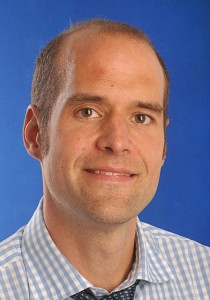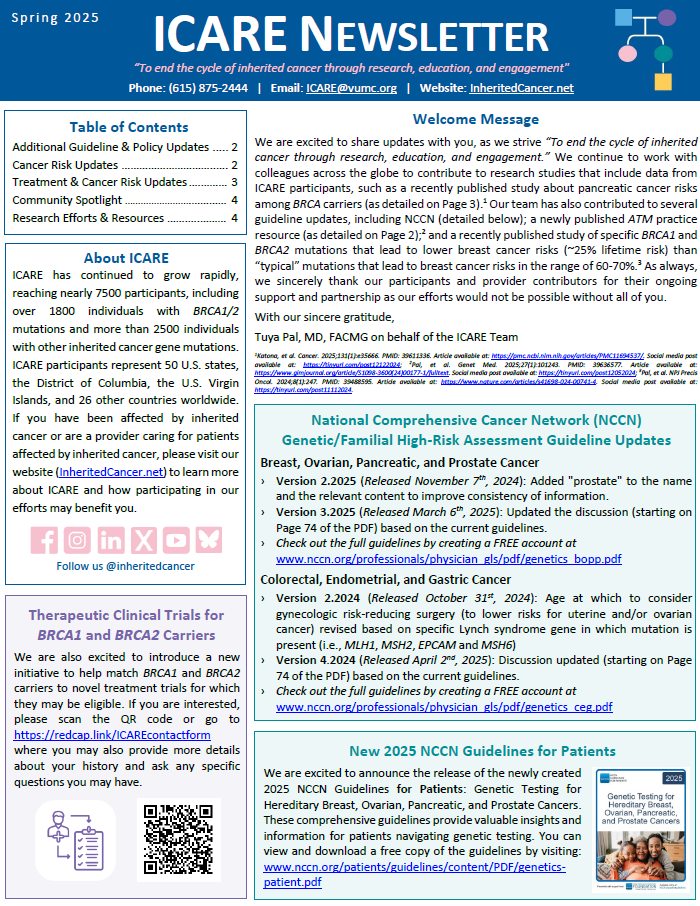What is PALB2?
A mutation in the PALB2 gene raises the risk for developing certain types of cancer. For women with a PALB2 mutation, the lifetime risk of breast cancer is ~35-40% compared to 12% in the general population. There may also be other increased cancer risks, including pancreatic and male breast cancer.

What is the Purpose of the PALB2 Study?
To determine the best treatment for women with a PALB2 mutation and breast cancer. Through a better understanding, we can personalize breast cancer treatment to increase survival, and determine how to best manage at risk family members to detect cancer early or prevent it.
Who is Eligible to Participate?
- Women with a pathogenic or likely pathogenic PALB2 mutation with or without a personal history of cancer
What Are Participants Asked to Do?
- Complete a baseline questionnaire, either on paper or online
- Complete a medical record release so the study investigators can collect information on genetic test results, breast cancer pathology, and treatment
- Agree to be contacted every two years to update your information
How Do I Join the PALB2 Study?
If you would like to participate in this PALB2 effort, please enroll in the Inherited Cancer Registry (ICARE) Initiative now by clicking the link below. Once enrolled, you will be asked to complete a baseline questionnaire and a study team member will inform you of any additional information that may be needed for this focused effort.
Please note if you are already an ICARE participant with a PALB2 mutation, we have already collected much of the information needed from you to contribute to this focused effort. We will inform you of any additional information that may be needed for study purposes.
Why Participate in the PALB2 Study?
Learning more about breast cancer among women with a PALB2 mutation will help to better understand: 
- If women with breast cancer have an increased risk of developing a new breast cancer
- The best treatment for women with a PALB2 mutation and breast cancer to increase the chance of survival
- How healthy family members who also carry a PALB2 mutation can best manage their cancer risks (through screening or preventive surgery, etc.)
Currently, we know little about breast cancers that occur in women with a PALB2 mutation. Thus, it is important:
- To figure out how to best treat women with PALB2 who develop breast cancer
- To help figure out how women with PALB2 without breast cancer can best manage their cancer risks and be proactive about their health
Who Are We?
We are a group of scientists who study hereditary breast cancer. Our research focuses on the prevention and treatment of breast cancer in women with a genetic mutation. We have studied the treatment of breast cancer in women with a BRCA1 or BRCA2 mutation and how treatment can be personalized for these women. We now want to understand if we should also personalize treatment for women with a PALB2 mutation who develop breast cancer. This study is a collaboration between Women’s College Hospital in Toronto, Canada (Drs. Kelly Metcalfe and Steven Narod) and Vanderbilt-Ingram Cancer Center in Nashville, Tennessee (Dr. Tuya Pal).

Tuya Pal, MD, FACMG
Tuya Pal is a board-certified clinical geneticist based at the Vanderbilt-Ingram Cancer Center, an NCI-designated Comprehensive Cancer Center in Nashville, Tennessee. Dr. Pal is also the Associate Director of Cancer Health Disparities.

Steven Narod, MD, FRCPC, FRSC
Steven Narod is a Tier I Canada Research Chair in Breast Cancer and a senior scientist at the Women’s College Research Institute in Toronto, Canada. He is a world-leader in the field of breast and ovarian cancer genetics. For further information on Dr. Narod, please click here.
 Kelly Metcalfe, RN, PhD
Kelly Metcalfe, RN, PhDKelly Metcalfe is a member of the Familial Breast Cancer Clinic at the Women’s College Hospital, where she provides genetic counseling and testing for individuals at risk of breast or ovarian cancers. She is a professor at the Lawrence S. Bloomberg Faculty of Nursing at the University of Toronto and an adjunct scientist at the Familial Breast Cancer Research Institute at the Women’s College Research Institute. For further information on Dr. Metcalfe, please click here.
 Marc Tischkowitz, MD, PhD
Marc Tischkowitz, MD, PhDMarc Tischkowitz is an Associate Professor in Medical Genetics at the University of Cambridge and Attending Staff at the East Anglian Medical Genetics Service. He was Faculty at McGill for six years before moving to Cambridge in 2011. Much of his research has focused on the Fanconi Anemia genes and hereditary breast cancer predisposition, but his interests cover all areas of hereditary cancer including the translation of recent advances in genome technology into clinical practice. He is the lead author on a New England Journal of Medicine article on breast cancer among PALB2 carriers and is considered a world-expert on PALB2. For further information on Dr. Tischkowitz, please click here. For more details about the PALB2 Interest Group, please click here.
If you are interested in learning more about PALB2, please click here to read previous ICARE newsletter articles and social media posts about PALB2.
For more information about this research study,
please contact our study team.
US: (615) 875-2444
Canada: (416) 323-6400 ext.2749
Email: ICARE@InheritedCancer.net


